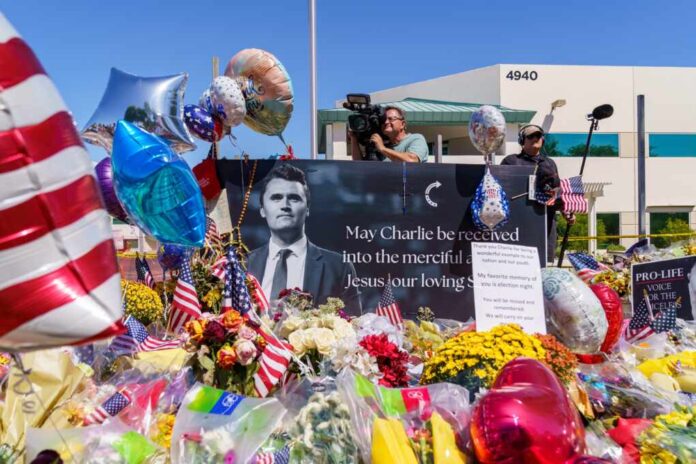
A tragic political assassination at a university event exposes grave security lapses, stirring national outrage.
Story Snapshot
- Charlie Kirk, a prominent conservative figure, was fatally shot at Utah Valley University.
- Suspect Tyler Robinson confessed in private chats but is uncooperative with authorities.
- The shooting is viewed as a politically motivated act, raising security concerns.
- Federal and local agencies are investigating possible extremist ties.
- Public mourning and political debates over ideological violence intensify.
Political Assassination Stirs Security Concerns
On September 10, 2025, Charlie Kirk, a leading conservative activist and founder of Turning Point USA, was fatally shot during an outdoor event at Utah Valley University. The suspect, 22-year-old Tyler Robinson, surrendered to law enforcement the following day but has since refused to cooperate. This incident, widely viewed as a politically motivated assassination, has sparked intense scrutiny over security protocols at public events, especially those featuring high-profile political figures.
Robinson reportedly confessed in private online chats, expressing his intent to target Kirk due to ideological opposition. The FBI and other law enforcement agencies are actively investigating to uncover any connections Robinson may have had to extremist groups. Despite these efforts, no clear motive has yet been officially established, although radicalization and ideological factors are being closely examined.
Watch: Charlie Kirk Murder: Tyler Robinson Makes A SHOCKING Confession, Did ‘Doppelganger’ Kill Kirk?
Impact on Political Discourse and Security Measures
The assassination of Charlie Kirk has sent shockwaves through the conservative community and beyond, prompting calls for justice and a reevaluation of security measures at public gatherings. With political violence being relatively rare in the U.S., this incident highlights the risks of ideological extremism and the need for enhanced protective measures for public figures. As political leaders like President Trump mourn Kirk’s death, they also emphasize the importance of addressing the root causes of political violence.
Utah Valley University, where the shooting took place, is under scrutiny for its handling of security at the event. With only six campus police officers present, questions are being raised about the adequacy of security measures for events involving controversial figures. This incident may lead to universities and other institutions reevaluating and potentially tightening their security protocols to prevent similar tragedies.
Ongoing Investigation and Community Response
As the investigation into Kirk’s assassination continues, law enforcement agencies are analyzing electronic devices seized from Robinson’s home to gather further evidence. The lack of cooperation from Robinson poses significant challenges, but authorities remain determined to uncover the full scope of his motivations and any potential connections to extremist groups.
The broader political and academic communities are grappling with the implications of this tragedy for free speech and safety at public events. Debates over political polarization, online radicalization, and ideological extremism are intensifying, with potential legislative or policy responses on the horizon. As the nation mourns, there is a collective push to ensure such violence does not become a norm in political discourse.
Sources:
Charlie Kirk shooting: Tyler Robinson uncooperative since surrender
Charlie Kirk shot at event in Utah; investigation ongoing

























